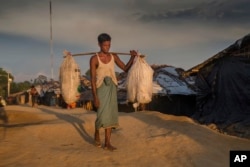Bangladesh is protesting a violation of its airspace by helicopters and drones from Myanmar, as tensions between the two countries escalate over a massive influx of Rohingya Muslim refugees into Bangladesh.
Bangladesh's foreign ministry summoned the charge d'affaires of Myanmar's embassy in Dhaka and warned the airspace violations could lead to “unwarranted consequences.”
This is the third time in three weeks that Bangladesh has summoned Myanmar's envoy as the refugee crisis of the Rohingya grows.
U.N. spokesman Stephane Dujarric said Friday that the number of Rohingya refugees who have fled across the border to Bangladesh has climbed to 391,000.
Rohingya refugees say Myanmar's military and members of the Buddhist majority have attacked their villages in northern Rakhine state, forcing them to flee. There are reports of villages being burned to the ground and the military deliberately targeting civilians, but access to the region is limited, so the reports can't be independently verified.
Dujarric said the first 15 of 35 scheduled trucks of aid provided by the U.N. refugee agency arrived in Cox's Bazaar on Friday, while other agencies are airlifting their supplies into Bangladesh.
The spokesman said the World Health Organization launches a vaccination drive on Saturday to immunize refugee children against measles and polio.
Also Friday, protests took place in Bangladesh and South Africa over the treatment of the Rohingya Muslims. Thousands of protesters in Dhaka urged Bangladesh's government to go to war over the issue, while a rally in Pretoria, South Africa, by hundreds of people turned violent with police firing stun grenades to disperse an angry crowd.
The protests follow other demonstrations in recent weeks in such countries as Afghanistan, Pakistan, India and Iran.
The Rohingya are a minority group largely based in Rakhine. Myanmar's government calls them Bengalis and considers them illegal migrants, even though many families have been in the country for generations.
Sectarian violence between the Rohingya and Myanmar's Buddhist majority has flared repeatedly over the past two decades, but the latest round is among the worst so far.






